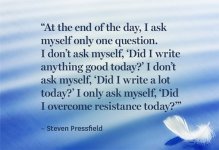Since I was wondering what Solomon meant by no point of view:
"When you are depressed, the past and the future are absorbed entirely by the present, as in the world of a three-year-old. You can neither remember feeling better nor imagine that you will feel better. Being upset, even profoundly upset, is a temporal experience, whereas depression is atemporal. Depression means that you have no point of view."
- Andrew Solomon
"When you are depressed, the past and the future are absorbed entirely by the present, as in the world of a three-year-old. You can neither remember feeling better nor imagine that you will feel better. Being upset, even profoundly upset, is a temporal experience, whereas depression is atemporal. Depression means that you have no point of view."
- Andrew Solomon

